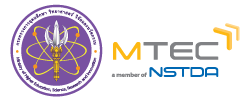
On October 15, 2024, in Meeting Room M119, National Metal and Materials Technology Center Building, Thailand Science Park
Dr. Asira Fuongfuchat, Deputy Executive Director of the National Metal and Materials Technology Center (MTEC) under the National Science and Technology Development Agency (NSTDA), together with Dr. Chanchana Thanachayanont, Director of the Environment Research Group at MTEC; Dr. Uracha Ruktanonchai, Director of the National Nanotechnology Center (NANOTEC); Dr. Sansanee Huabsomboon, Deputy Executive Director of NANOTEC; and Dr. Pimpa Limthongkul, Director of the Energy Innovation Research Group at the National Energy Technology Center (ENTEC), along with a team of researchers, warmly welcomed Dr. Masahiro Takemura, SIP Director – project manager and Mr. Kaname Takahashi, project engineer of the Cross-Ministerial Strategic Innovation Promotion Program (SIP) under the National Institute for Materials Science Japan (NIMS). Their visit aimed to engage in collaborative discussions and explore the facilities. SIP is a national initiative led by the Japanese government’s Council for Science, Technology, and Innovation (CSTI), employing an interdisciplinary management approach focused on scientific and technological innovation in Japan. The two sides identified three key areas for potential collaboration: (1) water treatment technologies, (2) materials for lithium-ion rechargeable batteries, and (3) NSTDA’s strategies for developing and transferring advanced technologies to benefit society. They also exchanged perspectives on evolving research trends shaped by changing socio-economic conditions and emerging societal demands, explored opportunities for future joint initiatives, and assessed R&D competitiveness. Additionally, the discussion emphasized NSTDA’s efforts in business development, including international partnerships with industry and academic institutions.


These exchanges laid the foundation for collaborative planning to secure international funding and develop project proposals across several key areas. Among the targeted initiatives are water treatment technologies aimed at removing heavy metals, negatively charged ions, and PFAS from drinking, industrial, and wastewater; lithium-ion battery materials tailored for electric vehicles and motorcycles; and the “Start-up & Incubation” program focused on “nurturing” emerging enterprises. SIP will convey the meeting’s outcomes to its partners in Japan and actively pursue future collaboration opportunities.



After the meeting, Dr. Samerkhae Jongthammanurak, the leader of the SMARTest Research Team in the Environmental Research Group, led the delegation on a tour of the Trace Element Analysis Laboratory (TEA-Lab) facilities. The team focuses on improving contaminant analysis capability in materials to meet RoHS standards, aiming to serve as a model for standardized testing facilities across Thailand while providing technical information to enhance testing capabilities and develop comprehensive guidelines. The tour ended with a visit to the Energy Storage Technology Team (ESTT) Laboratory, where Dr. Nattanai Kunanusont presented his battery pack design and development research. All research works generated significant interest from the delegation, laying the groundwork for future collaborations.



